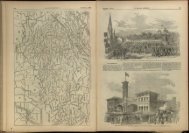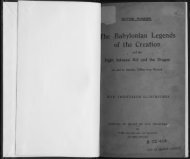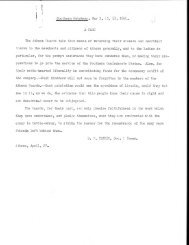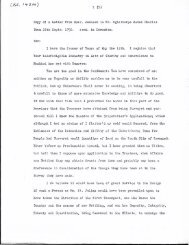THE SHE KING; OR, THE BOOK OF ANCIENT POETRY
THE SHE KING; OR, THE BOOK OF ANCIENT POETRY
THE SHE KING; OR, THE BOOK OF ANCIENT POETRY
Create successful ePaper yourself
Turn your PDF publications into a flip-book with our unique Google optimized e-Paper software.
36 PEINCIPLE ON WHICH PKESENT .VEESION IS MADE.<br />
Chinese writers presented to them faithfully, with as<br />
little introduction of ideas of my own or of my helpers as<br />
it was possible to attain to. Rhyme is often a hard<br />
master, and as it was our endeavour to give the pieces<br />
in as good English verse as the nature of the case would<br />
permit, it was necessary to employ occasionally epithets<br />
which are not found in the Chinese text, but this has<br />
been done sparingly. While much amplification would<br />
have been a misrepresentation of the original, a bad<br />
translation would often have been mere doggerel. And<br />
not only so; it would also have been unfaithful. There<br />
is more in the words of the text than meets the ear;<br />
it might be more correct to say, from the peculiar nature<br />
of the Chinese characters, than meets the eye. Apart<br />
even from the satirical pieces, and the allusive pieces on<br />
which I shall presently touch, in translating Chinese<br />
poetry one has constantly to regard what was in the<br />
mind of the writer. It was my object to bring this out<br />
in the notes in my larger work; and what was brought<br />
out there had to be transferred to the stanzas of the<br />
present version. But this also has been done only so<br />
far as seemed indispensable.<br />
I had some difficulty in getting rny nephews, of whose<br />
valuable assistance I have spoken in the Preface, to<br />
enter fully into my views of what their versions should<br />
be; and occasionally I had to re-cast their versions, the<br />
result being pieces inferior in poetical merit to what<br />
they had produced, but which I thought better repre<br />
sented the original Chinese. A correspondent in Hong-<br />
Kong, having himself no little of the poetical faculty,<br />
and condemning the adherence to the letter of the text<br />
even to the extent for which I contend, referred to the<br />
words of Horace in his De Arte Poetica,<br />
Et qua-<br />
Dcaperat Iractata nitescere posse, relinqidt.<br />
Horace, however, is giving his view of the course<br />
which an. oi'igiual poet should pursue, and I agree in the<br />
counsel which he suggests. But I was intending to<br />
come before the public not as an original poet, but as a<br />
translator in English verse of what Chinese poets wrote<br />
between two and three thousand years ago. If they<br />
PECTJLIAEITIES IN <strong>THE</strong>IE STECCTCEE. 37<br />
dealt with themes which they could not make to shine,<br />
it was still my duty to show how they load treated them.<br />
Nor did it appear to me that there was anything in the<br />
She, which might make me take warning from that other<br />
advice of Horace, touching me more nearly,<br />
Nee flcstties imitator in arctmn,<br />
Undo pcdem prvferrc piidor








